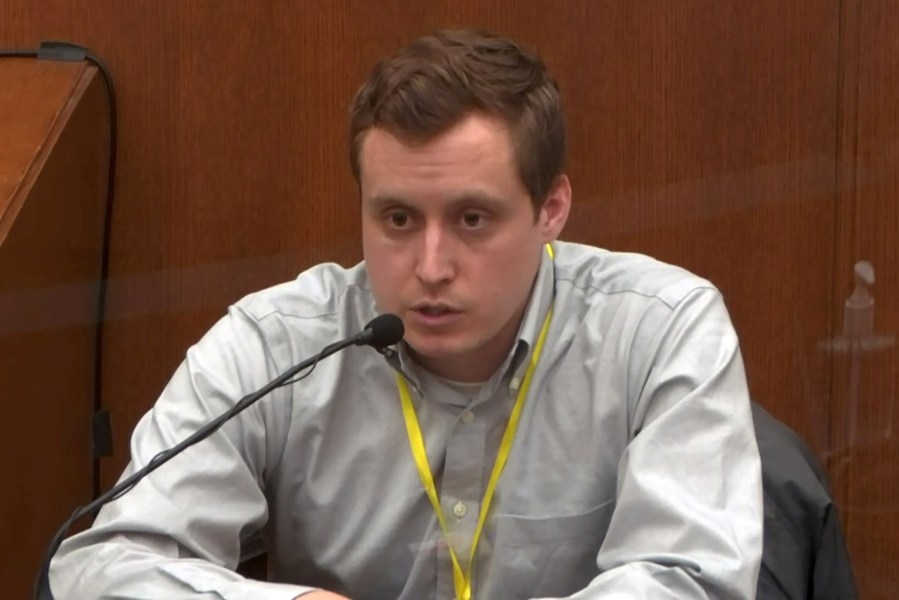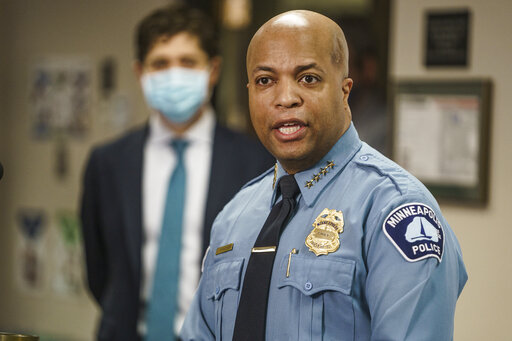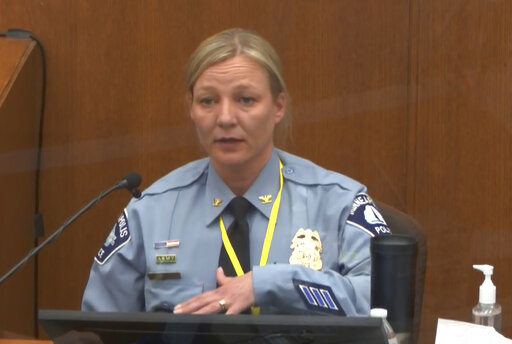MINNEAPOLIS (NewsNation Now) — The trial of a former Minneapolis police officer in George Floyd’s death continued Monday with the testimony from the police chief who fired Derek Chauvin and three other officers. Prosecutors also called the emergency room doctor who tried to resuscitate Floyd and a police department inspector to the stand.
NewsNation will provide live coverage of the trial online and the NewsNation Now app. You can watch the trial here.
The judge is also expected hear a motion Tuesday to quash the subpoena for the passenger in Floyd’s car, Morries Lester Hall, who says he will plead the Fifth Amendment if called to testify.
Floyd, a Black man, was declared dead after Chauvin, who is white, pressed his knee against his neck for about nine minutes. Video footage shows Chauvin pressing his knee into a handcuffed Floyd’s neck, with Floyd repeatedly claiming that he could not breathe. Floyd’s death sparked protests and civil unrest in Minneapolis and across the U.S. over police brutality, at points turning violent.
Emergency Room Dr. Bradford Langenfeld
The first witness to take the stand Monday, to start week two of the trial, was Dr. Bradford Langenfeld, an emergency doctor who pronounced Floyd dead after trying to resuscitate him and testified to the cause of Floyd’s death.

Langenfeld, a senior resident on duty that night at Hennepin County Medical Center, said that he was not told of any efforts at the scene by bystanders or police to resuscitate Floyd but that paramedics told him they had tried for about 30 minutes.
As prosecutors seek to establish that it was Chauvin’s knee on Floyd’s neck that killed him last May, Langenfeld said that every minute a patient spends in cardiac arrest without immediate CPR decreases the chance of a good outcome. He said there is an approximately 10% to 15% decrease in survival for every minute that CPR is not administered.
Langenfeld testified despite considering other possibilities to Floyd’s cause of death, including excited delirium, the doctor concluded death by asphyxiation was “more likely than the other possibilities.”
In addition to establishing the cause of Floyd’s death, prosecutors in the second week of the trial are expected to zero in on the officer’s training in the use of force. The first week of the case was dominated by emotional testimony from eyewitnesses and a graphic video of Floyd’s arrest.
Police Chief Medaria Arradondo
Chauvin broke Minneapolis police department rules and its ethics code in his deadly arrest of George Floyd last May, Arradondo testified at Chauvin’s murder trial.
“It’s not part of our training, and it is certainly not part of our ethics and our values,” Chief Medaria Arradondo told the jury.
Arradondo was the second witness to take the stand Monday. Arradondo, the city’s first Black chief, fired Chauvin and three other officers the day after Floyd’s death, and in June, called it “murder.”

“Mr. George Floyd’s tragic death was not due to a lack of training — the training was there,” Arradondo said then. “Chauvin knew what he was doing.”
Arradondo said police officers are instructed to treat the people they encounter with dignity and that part of the department’s motto requires officers to serve with compassion.
“To serve with compassion to me means to understand and authentically accept that we see our neighbor as ourselves, we value one another,” he told the jury.
Arradondo, who joined the department in 1989, also said officers receive annual training reminding them of department policies on giving first aid to people who need medical care.
“We are oftentimes the first face of government our community will see, and we will often meet them at their worst moments,” he told the jury when asked to describe the meaning of the badge the city’s roughly 700 sworn officers wear. “That has to count for something.”
Prosecutors say Chauvin’s knee killed Floyd. The defense argues that Chauvin did what he was trained to do and that Floyd’s use of drugs and underlying health conditions caused his death.
MINNEAPOLIS POLICE INSPECTOR KATIE BLACKWELL

The third witness to take the stand was Minneapolis Police Inspector Katie Blackwell, who was in charge of the department’s training center at the time of Floyd’s death.
Blackwell, who has known Chauvin for more than two decades, looked at the picture of Chauvin kneeling on Floyd saying, “I don’t know what kind of improvised position that is. That’s not what we train.”
Chauvin is charged with unintentional second-degree murder, third-degree murder and second-degree manslaughter in the May 25 death.
The three other former officers go on trial in August.
The city moved soon after Floyd died to ban police chokeholds and neck restraints. Arradondo and Mayor Jacob Frey have also made several policy changes, including expanding requirements for reporting use-of-force incidents and documenting their attempts to de-escalate situations even when force isn’t used.
Prosecutors have already called supervisory officers to build the case that Chauvin improperly restrained Floyd. A duty sergeant and a lieutenant who leads the homicide division both questioned Chauvin’s actions in pinning Floyd after officers responded to a report that Floyd had passed a counterfeit $20 bill.
“Totally unnecessary,” Lt. Richard Zimmerman, the longest-tenured officer on the force, testified Friday. He said once Floyd was handcuffed, he saw “no reason for why the officers felt they were in danger, if that’s what they felt, and that’s what they would have to feel to be able to use that kind of force.”
Zimmerman, who joined the department in 1985, said he has never been trained to kneel on someone’s neck if their hands are cuffed behind their back, and they are in the prone position. Officers are supposed to get a person out of the position as soon as possible because it restricts their breathing, he said.
Instead, officers continued to restrain Floyd until an ambulance arrived — even after he became unresponsive.
Chauvin attorney Eric Nelson peppered Zimmerman with questions about the threat a handcuffed suspect might still pose, as well as whether handcuffs might fail. Nelson has also suggested that bystanders shouting at police might have distracted them from Floyd and made them feel threatened.
Jurors heard several days of testimony from those bystanders, several choking up as they recalled feeling powerless to help Floyd and guilt over his death.
Genevieve Hansen, an off-duty firefighter who came on the scene as she was out for a walk, said she immediately recognized Floyd was in trouble and tried to offer help. Instead, Officer Tou Thao ordered her to stay on the sidewalk. Hansen, who was mostly stoic while testifying, was overcome as she recalled her frustration.
“There was a man being killed,” she said. “I would have been able to provide medical attention to the best of my abilities. And this human was denied that right.”
The Associated Press contributed to this report. Reporting by AP’s Steve Karnowski, Amy Forliti and Tammy Webber.